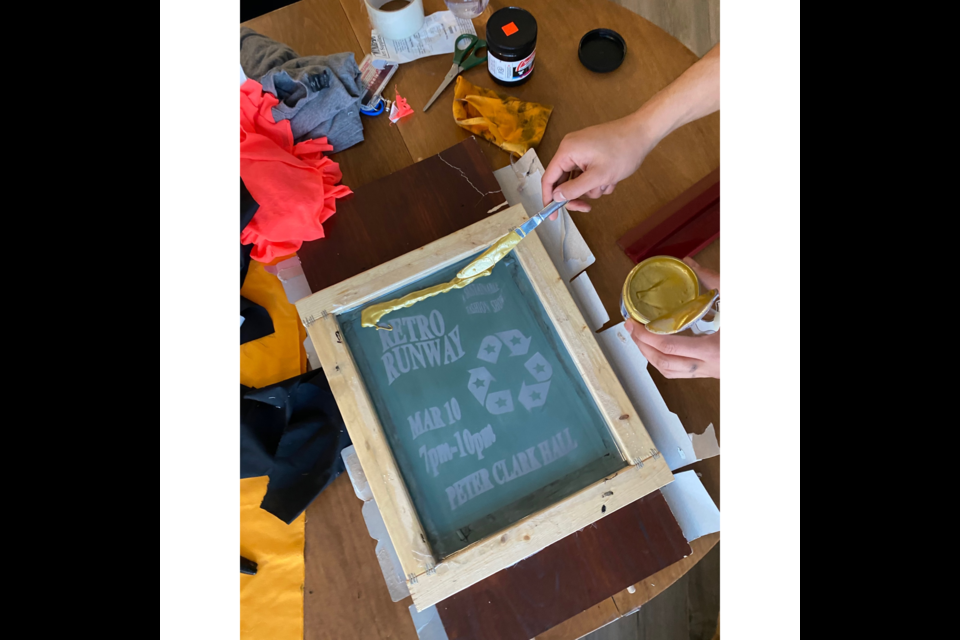The whole idea of being in fashion is to embrace what is new and popular and shed what is passe or unfashionable.
Many see the concept as antithetical to sustainability and environmental studies carried out by the United Nations and other organizations have revealed the impact the fashion industry is having on the environment.
“People often cycle through clothes really fast,” said University of Guelph student Sara Low. “They wear it a couple times then never wear it again then it ends up in a landfill.”
Low has joined forces with fellow student Gale Gamboa and others from the Sustainability Office at U of G to promote Retro Runway, a fashion show that celebrates sustainability and ethical fashion.
There will be 13 local designers and thrift and consignment shops showing their wares from 7 p.m. to 10 p.m. Tuesday, March 10, at Peter Clark Hall. Admission is $5.
“We wanted to do a project that would somehow benefit sustainability on campus,” said Low. “We both have a different interest in sustainability and we are both interested in the fashion industry and how wasteful that can be. Fashion and the mass production of clothes is really wasteful.”
According to studies released by the United Nations Environment Programme, the fashion industry is responsible for 10 per cent of the world’s industrial carbon emissions. Textile dyeing is the second largest producer of water pollution and industrial clothing production consumes 20 per cent of the world’s fresh water.
The study revealed that it takes more than 3,000 litres of water to produce one cotton shirt and more than 7,500 litres to produce one pair of jeans. It is estimated that 85 per cent of textiles will end up in landfill.
Low is studying environmental biology and Gamboa is studying bio-mathematics at the U of G so they are both well aware of the growing research into the fashion industry’s impact on the environment but they are hoping to share that information to the wider public.
“We were looking for ways to do more of an outreach thing where it would be more than just for environmental students but for all the students on campus to come and be part of this,” said Gamboa. “We did a little bit of brainstorming and came up with this idea about sustainable fashion and a fashion show.”
They sought insight from fashion entrepreneur and environmentalist Yoshitake Matsuzaki, founder of Project Trashion, who has been promoting ethical and environmentally sustainable fashion events and activities since 2018.
“The idea started in Waterloo with Project Trashion,” said Gamboa. “We reached out to him and he was really happy to give us more info.”
They hope the growing popularity of Project Trashion will spread to Retro Runway in Guelph and beyond.
“This is our first one,” said Low. “We are trying things out to see what works and what doesn’t. It will definitely be a test.”
They recognized Guelph as an ideal community to promote and grow the concept.
“We have noticed that in Guelph people are interested in it,” said Low. “People are kind of hippy and into that sort of thing so, we thought the crowd was right as well.”
Retro Runway will have most of the trappings of a traditional fashion show.
“We’re not doing an actual elevated runway but it will be a typical fashion show,” said Low. “Models come on. They pose long enough for pictures and reassemble in another pose.”
“The first half is designated specifically for people who are designing their own clothes,” said Low. “They have used old clothes or sustainably sourced fabric to make their own stuff. The second part will be existing clothes from thrift stores .”
There will also be opportunities to talk to designers and buy clothes at the event.
“We have also integrated the idea of a pop up shop to support our local designers,” said Gamboa. “So, once the show is done there will be tables at the back for the designers to sell their clothes.”
They are hoping to influence people’s perspective on being in fashion.
“The idea of the fashion show is to push the idea of sustainability in the fashion industry,” said Low. “It can be a lot of fun when you find something cool thrift shopping. It’s very cost effective and environmentally sustainable at the same time.”



